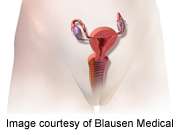'Surgeon-tailored' mesh repair resolves urinary incontinence

(HealthDay) -- "Surgeon-tailored" polypropylene mesh (STPM) repair using a transobturator midurethral sling procedure alone or in combination with pelvic organ prolapse repair is an effective treatment for stress urinary incontinence symptoms, although some concerns remain regarding mesh-related complications, according to a study published in the August issue of Urology.
Fikret Fatih Önol, M.D., of the Ümraniye Training and Research Hospital in Istanbul, and colleagues conducted a study involving 52 women with stress urinary incontinence and pelvic organ prolapse who were treated with transobturator midurethral sling alone, and 74 women who received concomitant pelvic organ prolapse repair. One-hundred eighteen women were available for follow-up.
During follow-up the researchers found that 86.4 and 81.1 percent of sling-treated patients and sling plus pelvic organ prolapse repair patients, respectively, were cured of their stress urinary incontinence. Nearly all (98.6 percent) patients were cured of their pelvic organ prolapse. Preoperative urge symptoms resolved for 53.8 and 62.5 percent of sling and sling plus pelvic organ prolapse repair patients, respectively; however, new urge symptoms developed in 22 and 15 percent, respectively. In 11 patients (14.8 percent) who underwent concomitant pelvic organ prolapse repair vaginal mesh erosions were observed.
"STPM may represent a cost-effective option for stress urinary incontinence treatment. Concomitant pelvic organ prolapse repair with STPM does not affect incontinence outcomes and provides high anatomic success and patient satisfaction in the long term," the authors write. "An improved understanding of the risk factors for mesh erosion, development of more bio-compatible implant materials, and better definition of patient selection criteria will define the role of transvaginal mesh surgery for pelvic organ prolapse management in the future."
More information:
Abstract
Full Text (subscription or payment may be required)
Editorial (subscription or payment may be required)
Copyright © 2012 HealthDay. All rights reserved.















